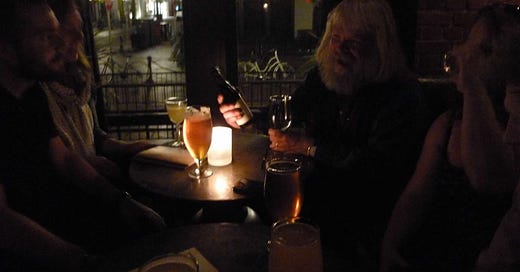You appoint turning points where they should be— a worm or whale that reveals something more but, Jonah-hearted people to the core, we flee when called to add to your story. Write in another scene for us, or we forget how abba-abba came before and only read polygamy and war. Remind us of redemption’s history! Our vision, long bloodied, muddied and blurred— now yours is as you live our first eight lines— in death you pivot all that we preferred. Jesus, you’re not plan B, but you surprise— You are the Father’s Volta, you re-Word and body forth a sestet in reply.
NOTES
*During Lent this year, I am sharing some of my older poems. This one is the oldest poem of mine, essentially. Sure, I wrote poems in my journal as a young girl (mostly strung together phrases from the Bible) and when I met my now-husband, I couldn’t help but put some of those feelings to verse (I called us an “unfinished painting,” it was pretty romantic), but the first time I ever sat down to write a poem, this is what I wrote. And big surprise, in this first poem, Anna wrestles with the OT.
*It was in response to a summer course I took at Regent College taught by Malcolm Guite in 2016. The class served as an introduction to poetry for me, especially sonnets. So I wrote 3 sonnets and sent them to Malcolm. He encouraged me to try to get them published. And one was accepted for publication (not this one) in the very journal he recommended!
*But this one y’all, working on this poem was one of the most joyful things I had ever done in my life. It’s not that I thought (or think) I had crafted an amazing sonnet, it was the experience of working out the meter, the imagery, the turn, the boundaries of rhyme and length, this playing with the idea of the whole of the Scriptures and life with God as a poem, and Jesus as the Volta. I remember talking to my sister on the phone and asking, “Have you ever tried to write a sonnet?!” in pure wonderment, as if I had found the sapphire at the fountain’s heart.
*Here’s what I wrote Malcolm way back then about this sonnet:
During the course…I was drawn to the word Volta, the turning point in sonnets. It was so helpful to learn that traditionally sonnets pose a question or questions in the first eight lines—the octave, and then there is this turn, the volta, and next comes the sestet— the last six lines. These six lines function as a response of some sort or even an answer or a working-out of what has been expressed as a tension or difficulty at first. I have never attempted to write a sonnet before. I decided to use the Italian form because, when I first read about it, and saw the rhyme scheme of the octave described as abba-abba, my imagination kept taking hold of that as a sort of chant, saying, “Abba, Abba, Abba, Abba,” as in “Abba, Father” … Jesus breaks into this sonnet as the pivot or turning point. I wanted to show that he is not a pivot because God decided to scrap his first plan and go with something wholly different, but instead to see him as fulfilling or re-Wording God’s salvation plan. He does this through entering our “first eight lines,” by entering our questions and struggles and strife. He takes on flesh and from the inside of human experience he chants “abba-abba” into our hearts…The sestet is the life we now get to live with him and in him.





This is a delightful sonnet. I really love the abba-abba play. I had to pause when I got to it, look at the rhyme scheme, and then what delight when I confirmed the double-meaning.
Jesus as the volta breaking into the sonnet, the planned turn that the poem was always going to come to... that's a really delightful conceit.
And I'm totally fan-girling in wonderment that you got to take a class with Malcolm Guite and that he encouraged you to punish your poems. What an amazing treat!
I read
and then read your notes
and then paused to take in what these new to me words mean (Volta, sestet, I'm uneducated you see)
and then read it thru again, amazed at the depth of meaning and with such power each word choice and placement brought.
thank you for giving us both the sonnet and the notes
I am inspired to learn more about writing poetry
and moved into Wonder at our Word made flesh.